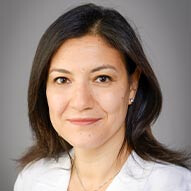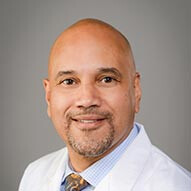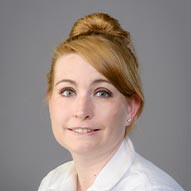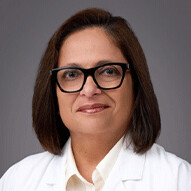Pediatric Alagille syndrome (ALGS)
Pediatric Alagille syndrome (ALGS) can affect multiple organs in the body. At Children's Health℠, kids with Alagille syndrome are seen by liver, heart, kidney and other experts who address all their health needs as one team so they can grow up healthy and happy.
What is pediatric Alagille syndrome (ALGS)?
Alagille syndrome is a genetic disorder that usually affects the development and function of the liver. Specifically, it makes it hard for the liver to pass bile — a substance made by the liver that helps the body digest food and process waste — to the small intestine. This is because the liver has smaller or fewer bile ducts (tubes) than normal.
This can affect the body in lots of different ways. For example, the skin may become yellow or itchy, the liver may become enlarged and lose function, and the body may not absorb fats and vitamins as well.
Alagille syndrome can affect other organs too. This includes the heart, where issues can range from a harmless heart murmur to structural defects that require surgery.
Because the variety of potential symptoms and health impacts is so wide, children with Alagille syndrome should receive care from a multidisciplinary team, who can care for their full range of needs.
Alagile syndrome is named after Daniel Alagille (a French pediatrician) who described the disease with his colleagues in 1969.
What are the signs and symptoms of pediatric Alagille syndrome (ALGS)?
On the skin:
Yellow bumps (xanthomas)
In other organs:
Liver disease
Opaque ring in the cornea of the eye (posterior embryotoxon)
Heart murmur (an unusual or extra heart sound)
Problems with heart valves or the heart wall
Blood vessel problems in the brain
Facial features:
Deep-set eyes
Large ears
Small, pointed chin
Wide forehead
Other:
Vertebrae shaped like flying butterflies
White or gray-colored stools
Dark urine
Poor weight gain or growth
How is pediatric Alagille syndrome (ALGS) diagnosed?
Many children with Alagille syndrome show jaundice and other signs of liver disease in the early months after being born. When that happens, we do tests right away to see what’s causing it. In other cases, children may have milder symptoms that show up when they’re a few years old. These can vary a lot, and none of them automatically mean a child has Alagille syndrome. So our experts look for combinations of common symptoms, such as jaundice, butterfly vertebrae, and certain features of the eye and face.
We use blood, liver biopsy and genetic tests to get a clear picture of what’s happening in the body and what’s causing it. Blood tests can measure vitamins and other contents of the blood that are often affected by Alagille syndrome. A liver biopsy means we study a small sample of liver tissue, which can have certain characteristics that indicate Alagille’s syndrome. A biopsy also helps us determine how advanced a child’s liver disease is. Finally, a genetic test will confirm the diagnosis in most cases.
If we know or suspect your child has Alagille syndrome, we do additional tests to check on their liver, kidneys, heart and other organs that are often affected by the disease. Sometimes Alagille syndrome doesn’t do any harm to other organs, but sometimes it can have a serious effect. Our care team includes experts in all these parts of the body who know what to look for and what treatments may be necessary.
What causes pediatric Alagille syndrome (ALGS)?
Most cases of Alagille syndrome happen because of a change in a specific gene. Sometimes this gene change is inherited from a parent, and sometimes it develops on its own while the fetus is developing. A small number of cases are caused by a change in a different gene, but the range of symptoms and effects on the body are the same.
How is pediatric Alagille syndrome (ALGS) treated?
We treat Alagille syndrome by bringing together all of the different specialists your child needs, including:
Hepatologists (liver experts) who can prescribe medicines and perform procedures to improve the liver function and help with itching and managing complications
Liver surgeons can perform surgeries to improve bile flow to relieve itchy or bumpy skin when medical therapy is not sufficient
Heart and kidney experts who manage any treatments necessary to protect or improve the function of those organs
Neurology experts who can manage structural abnormalities in the blood vessels of the brain
Dietitians who can provide nutrition advice, including vitamin supplements and meal planning
All of these experts work together as one team, coordinating treatments and addressing all your child’s health needs.
Pediatric Alagille syndrome (ALGS) doctors and providers
The team at our Pediatric Liver Disease Center features hepatologists (liver experts) and gastroenterologists with special training in conditions like Alagille syndrome. When necessary, these experts work closely with dieticians, heart specialists and other providers to address all of your child’s health needs and help them grow up healthy and happy.
 Amal Aqul, MDPediatric Hepatologist
Amal Aqul, MDPediatric Hepatologist Lauren Lazar, MDPediatric Gastroenterologist
Lauren Lazar, MDPediatric Gastroenterologist Megha Mehta, MDPediatric Gastroenterologist
Megha Mehta, MDPediatric Gastroenterologist Charina Ramirez, MDPediatric Gastroenterologist
Charina Ramirez, MDPediatric Gastroenterologist Norberto Rodriguez-Baez, MDPediatric Hepatologist
Norberto Rodriguez-Baez, MDPediatric Hepatologist Isabel Rojas Santamaria, MDPediatric Gastroenterologist
Isabel Rojas Santamaria, MDPediatric Gastroenterologist Phuong Luu, PA-CPhysician Assistant - Gastroenterology
Phuong Luu, PA-CPhysician Assistant - Gastroenterology To Nhu Nguyen, PA-CPhysician Assistant - Gastroenterology
To Nhu Nguyen, PA-CPhysician Assistant - Gastroenterology Jennifer Peacock, APRN, PNP-PCNurse Practitioner - Gastroenterology
Jennifer Peacock, APRN, PNP-PCNurse Practitioner - Gastroenterology Shabina Walji-Virani, APRN, PNP-PCNurse Practitioner - Gastroenterology
Shabina Walji-Virani, APRN, PNP-PCNurse Practitioner - Gastroenterology